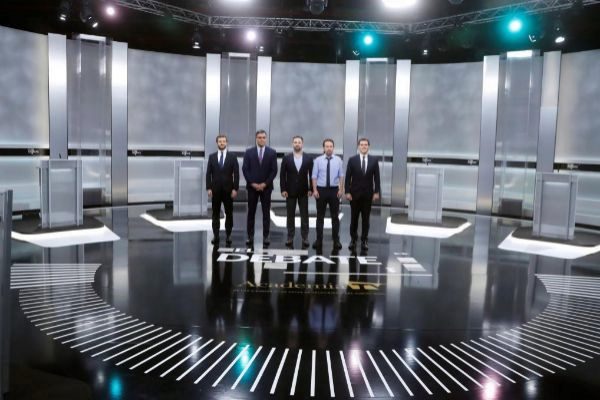The Spaniards are called to the polls tomorrow for the fourth time in five years. The blockade, the crossing of vetoes and, above all, the inability of Pedro Sánchez to draw alliances have led our country to a new electoral call . We cannot predict the result of 10-N, but we can already verify the harmful effects of the electoral repetition. To the lack of response to the secessionist challenge, aggravated by the wave of violence of the filoterrorist factions of independence, the progressive deterioration of our economy and the possibility that extremisms come out reinforced are added. All this preludes, and this is certified by practically all polls, a panorama of ungovernability that is the result of an even more pronounced fragmentation and the toxic polarization climate in which Spanish policy has run aground.
Sanchez left the elections of 28-A with the possibility of building a government left and right. However, his inclination for tacticism - encouraged by his closest collaborators and before the silence of a party delivered to the Caesarist personality of his leader - led him to opt for an electoral repetition. The socialist candidate received from the King the commission to form a government. Instead of embarking on the active search for parliamentary support to guarantee his investiture, he embarrassed a shameful paripé with Podemos and, once the failure of the first vote was consummated, he let the term expire before the stupefaction of all citizens. It could not activate the Frankenstein Government, formed by the unstable and radical sum of support to which it was delivered in the motion of censure, by the situation in Catalonia; nor did he ever want to gain the support of the forces of the center right. He preferred to paraperse himself in the immobility, which had criticized his predecessor so much, and demand that the PP and Citizens an unconditional abstention , despite the fact that he himself made a political and personal flag of the veto to Mariano Rajoy before his investiture in 2016. Liquidate The legislature almost before it started and squandered the arithmetic combinations offered by the correlation of forces that emerged in April portrays the ambition of a leader capable of taking an entire country hostage to his personal tactics. It is not the citizens who were wrong by voting on 28-A. It is our politicians, with the socialist leader in the lead, who have spoiled a result that could have resulted in a stable parliamentary majority with a reformist vocation.
Sanchez's frivolity in avoiding other elections constitutes the greatest irresponsibility of Spanish democracy since its reinstatement in 1977 . There is no reason, much less partisan, to justify forcing the Spaniards to a new election date in a context of worrying economic erosion and just when separatism has redoubled its blackmail to the State after the conviction for sedition to political leaders and social of the 1-O coup. The price to be paid will not only result in greater fragmentation and radicalization of Parliament, but also in the ties that a functioning Executive entails in responding to the two main challenges: the independence threat and the economic slowdown. Sanchez, who has imposed hardness with the independentistas during the campaign, plays his own future after summoning the Spaniards to "speak clearly." Pablo Casado aspires to consolidate as an alternative, although for this the PP is obliged to contain the foreseeable rise of Vox. Albert Rivera faces an extraordinarily complicated revalidation judging by polls. In any case, the inability of the two blocks to reach the absolute majority should translate into transversal agreements.
The seriousness of the situation that Spain is going through demands that the constitutionalist parties demonstrate a height of sights that they have lacked so far. The vote of the Spaniards cannot be subject to the organic interests of any party. Our country resolves in Catalonia the survival of the system illuminated in 78. Secessionist rupturism, coupled with the signs of distrust of Brussels, force the main parties to an exercise of moderation and stability. Only the articulation of a great state agreement that pivots on policies that respect fiscal rigor and social cohesion, will allow to get out of marasmus.
There are no longer any extensions or to remain installed in frivolity. Both PSOE and PP and Citizens must leave the short term . If the whole of the parliamentary arch had acted with myopia during the Transition, neither consensus nor concord would have been possible. Recovering the spirit that presided over this stage would be the most reasonable option to deal with pending reforms. The credit of democracy cannot be exhausted by the vanity of any politician. Hence the importance of appealing to the civic courage of citizenship. Despite the understandable social unrest generated by the timing of the blockade, self-voting is not an advisable option for general interests. Spain does not play tomorrow only the formation of a government, but lay the groundwork to renew the constitutional pact and thus ensure a solid defense of the nation against the nationalist onslaught.
According to the criteria of The Trust Project
Know more- PP
- Spain
- Citizens
- Catalonia
- Mariano Rajoy
- We can
- Pedro Sanchez
- Pablo Casado
- PSOE
- Vox
- Albert rivera
- Politics
- Editorial
Sanchez must break all ties with separatism
EditorialA campaign without certainties
EditorialThe Government must protect voters on 10-N

